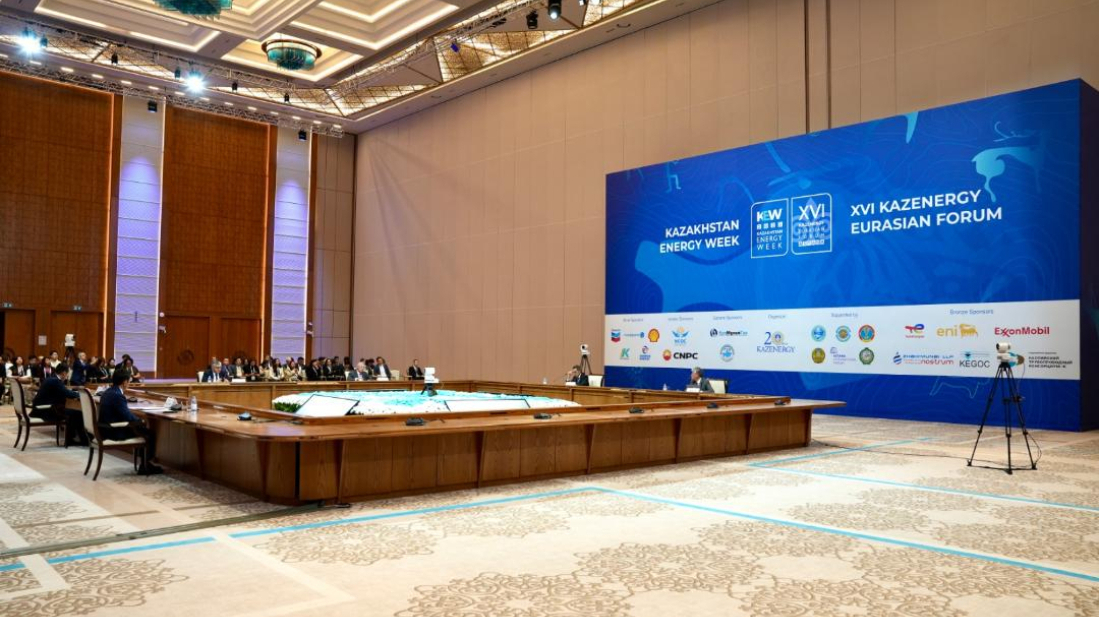Greece’s prime minister visits Türkiye: What’s at stake
Kyriakos Mitsotakis is due in Türkiye on Wednesday for talks with Recep Tayyip Erdoğan, as the two NATO allies seek to sustain a fragile thaw after ...

Kazakhstan Energy Week underlined that doubling energy efficiency gains could cut global CO₂ emissions by half by 2040, with officials calling efficiency the cornerstone of a pragmatic and balanced energy transition.
At Kazakhstan Energy Week, senior officials and energy leaders stressed that the world’s transition cannot be achieved through the exclusion of hydrocarbons alone, but rather through cleaner and more efficient use of all resources. Vice minister of energy Sanzhar Zharkeshov said global energy demand could climb by 46% by 2050 compared with 2020, making it critical to optimise every source — oil, gas, coal, nuclear, solar and wind.
“The main task is not to remove sources but to make them cleaner and more efficient,” Zharkeshov told the forum. He said many governments are now pivoting from an overemphasis on rapid decarbonisation toward a more balanced and pragmatic energy policy. For developing countries, he stressed, national realities and individual transition speeds must be respected.
Zharkeshov placed special emphasis on efficiency as the fastest and most cost-effective tool to cut emissions. “By doubling the rate of energy efficiency improvement, global CO₂ emissions could be halved by 2040,” he said. He added that digitalisation and artificial intelligence can transform energy systems, boosting grid reliability, reducing losses, and lowering costs.
Kazakhstan is pursuing what it calls an evolutionary approach to the transition. Hydrocarbons will remain central to its economy but will increasingly be paired with clean technologies such as carbon capture. At the same time, the renewable sector is expanding: 158 facilities with a total capacity above 3.2 GW are already operating. Renewables provided 6.4% of the country’s electricity in 2024, with the government targeting 15% by 2030.
Energy experts at the event agreed that efficiency, supported by innovation and technology, will define the pace and scale of change. For Kazakhstan, the approach blends economic realism with climate ambition, aiming to keep hydrocarbons cleaner while rapidly expanding renewable capacity. The message from Astana was clear: efficiency is not just an add-on but the foundation of the global energy transition.
U.S. President Donald Trump has criticised American freestyle skier Hunter Hess after the athlete said he felt conflicted about representing the United States at the Winter Olympics in Italy, sparking a public clash that highlights growing political tensions surrounding the Games.
U.S. skiing great Lindsey Vonn underwent surgery in an Italian hospital on Sunday after her attempt to win Olympic downhill gold ended in a violent crash just seconds into the race at the Milano Cortina Winter Games.
JD Vance arrived in Armenia on Monday (9 February), becoming the first sitting U.S. Vice President to visit the country, as Yerevan and Washington agreed to cooperate in the civil nuclear sector in a bid to deepen engagement in the South Caucasus.
António José Seguro’s decisive victory over far-right challenger André Ventura marks an historic moment in Portuguese politics, but analysts caution that the result does not amount to a rejection of populism.
Buckingham Palace said it is ready to support any police investigation into allegations that Prince Andrew shared confidential British trade documents with late sex offender Jeffrey Epstein, as King Charles expressed “profound concern” over the latest revelations.
J.D. Vance met Azerbaijan's president Ilham Aliyev in Baku on a rare visit by a sitting U.S. vice president, signalling a renewed push to deepen cooperation with Azerbaijan on energy, security and regional stability.
A scheduled visit to Ankara this week by Greek Prime Minister Kyriakos Mitsotakis will seek to “resolve all our problems at the table,” Ömer Çelik, a spokesman for Türkiye’s ruling AK Party, has said.
The European Union is preparing a further expansion of its sanctions against Russia, with Central Asia emerging for the first time as a distinct point of focus.
Azerbaijan and the United States signalled closer economic ties on Monday (9 February) as President Ilham Aliyev hosted a delegation from the U.S. Chamber of Commerce, highlighting the country’s investment appeal and growing interest from American companies.
“Peace is not just about signing treaties - it’s about communication, interaction and integration,” Sultan Zahidov, leading adviser at the AIR Center, told AnewZ, suggesting U.S. Vice President JD Vance's visit to the South Caucasus could advance the peace agenda between Azerbaijan and Armenia.
You can download the AnewZ application from Play Store and the App Store.

What is your opinion on this topic?
Leave the first comment